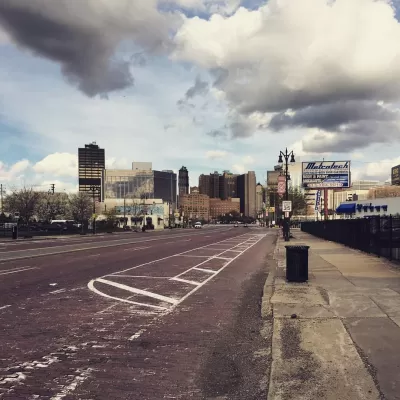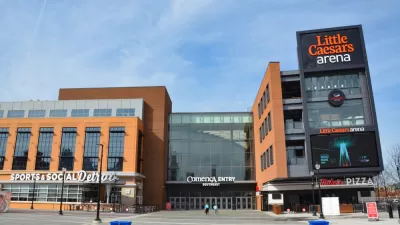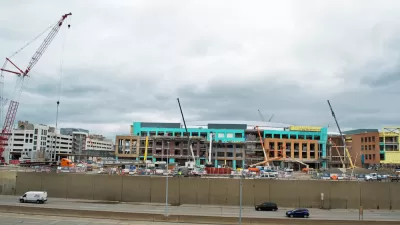The Detroit project was slated to become a massive sports and entertainment district. After five years, little has changed.

Tom Perkins reports on the current status of the District Detroit, a 50-block area near downtown that includes Little Caesar's Arena. Detroit's wealthy Ilitch family owns the arena along with many of the derelict properties in the area. In 2013, the family proposed a plan to turn the neighborhood around. "The Ilitches promised $200m in development around the arena, claiming new housing, stores, restaurants, bars and offices would bloom," says Perkins.
Even with a big tax break from the city, very little has happened in the last five years. "Instead of gaining luxury lofts, [the District Detroit] lost housing, and the Ilitches have only renovated a small fraction of the hundreds of properties its companies purchased here," according to Perkins.
Not only has the area failed to improve; in some ways its condition has deteriorated even more, says Perkins:
On blocks where historic buildings once stood, they have laid dozens of surface parking lots. Those are controversial because the Ilitches charge up to $50 per spot, and a vast stretch of once-dense downtown real estate is now a sea of Ilitch-owned parking spaces.
While the project did not draw upon the city's general fund, Perkins notes that the Detroit did give up substantial tax revenue from arena operations–what could have amounted to more than $336 million for the general fund.
Critics say the city cut a bad deal, with little oversight or accountability, implying that the lack of progress in the District Detroit is not necessarily a surprise. Residents and business owners are now skeptical after seeing little action, but they are still hoping improvements will come.
FULL STORY: Big promises for a thriving urban core in Detroit vanish in a swath of parking lots

Alabama: Trump Terminates Settlements for Black Communities Harmed By Raw Sewage
Trump deemed the landmark civil rights agreement “illegal DEI and environmental justice policy.”

Study: Maui’s Plan to Convert Vacation Rentals to Long-Term Housing Could Cause Nearly $1 Billion Economic Loss
The plan would reduce visitor accommodation by 25% resulting in 1,900 jobs lost.

Why Should We Subsidize Public Transportation?
Many public transit agencies face financial stress due to rising costs, declining fare revenue, and declining subsidies. Transit advocates must provide a strong business case for increasing public transit funding.

Wind Energy on the Rise Despite Federal Policy Reversal
The Trump administration is revoking federal support for renewable energy, but demand for new projects continues unabated.

Passengers Flock to Caltrain After Electrification
The new electric trains are running faster and more reliably, leading to strong ridership growth on the Bay Area rail system.

Texas Churches Rally Behind ‘Yes in God’s Back Yard’ Legislation
Religious leaders want the state to reduce zoning regulations to streamline leasing church-owned land to housing developers.
Urban Design for Planners 1: Software Tools
This six-course series explores essential urban design concepts using open source software and equips planners with the tools they need to participate fully in the urban design process.
Planning for Universal Design
Learn the tools for implementing Universal Design in planning regulations.
Caltrans
Smith Gee Studio
Institute for Housing and Urban Development Studies (IHS)
City of Grandview
Harvard GSD Executive Education
Toledo-Lucas County Plan Commissions
Salt Lake City
NYU Wagner Graduate School of Public Service





























